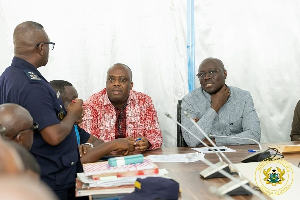Bolgatanga, July 20, GNA - Mr Jonathan Adabre, policy analyst of Integrated Social Development Centre (ISODEC), on Wednesday expressed worry about abuse of state resources by political parties, especially those in government during elections.
He alleged that there were many instances where contracts were awarded by a political party in power to party executives in the national, regional and constituency levels.
Mr Adabre, who raised the concern during the 11th National Constitutio= n Week in Bolgatanga, said 93The difference between party and government is so blur that the governing party tend to rely on state resources to exact patronage in order to maintain party organization and management. This practice offends constitutionalism and multi-party democracy", he said. The event aimed at assessing the contribution of political parties in Ghana in consolidating democratic governance and practices, and the challenges of the past two decades of Ghana's democracy and the way forwa= rd.
Mr Adabre said that it was largely due to those practices that political parties were not able to declare to the public their revenue and assets and their sources of revenue, assets and to publish to the public annually their audited accounts as required under article 55 clauses 14 of the 1992 constitution."
The ISODEC policy analyst lamented that since Ghana's independence, political parties had fueled ethnicity and ethnic passions, stressing that political parties had tended to resort to the ethnic card to win political power.
Mr Adabre said: 93Today, the labeling of the Ashanti region as the Wo= rld Bank of the New Patriotic Party and the Volta region as the World Bank of the National Democratic Congress is inherently ethnic. What it means is tha= t Asantes vote for NPP and Ewes vote for NDC. This ethnic balkanization, covertly basked by the two parties is offensive to the tenet of democracy and our constitution and is a potential tipping edge for national disintegration".
Mr Adabre said that though Ghana had been hailed by the world as a beacon of democracy in Africa, it should not be complacent but strive to meet international standards of democracy and appealed to all political parties to be circumspect in their dealings.
The Deputy Chairman of the National Commission on Civic Education (NCCE), Mrs Augustina Akosua Akumanyi, tasked political parties to examine their funding status, recruitment drive and ensure proper registration of members. She said that political parties could have funded their activities if they had initiated proper mechanism to ensure that members paid their dues regularly. Mrs Akumanyi called on political parties to educate their members abou= t their ideologies, manifestoes and constitutions and to advise their supporters to be law abiding.
She said that the views gathered at the roundtable in all the regions would be forwarded to Parliament as a mandate of the Commission. The Upper East Regional Director of NCCE, Mr Peter Mensah, said plans were far advanced to revive the inter-party dialogue and asked all politica= l parties to participate such meetings.
General News of Wednesday, 20 July 2011
Source: GNA












